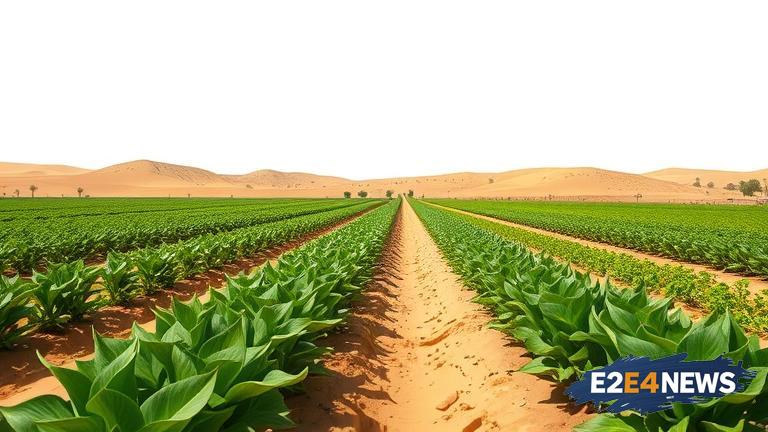Israel has been at the forefront of agricultural innovation, and its latest desert farming techniques are revolutionizing the way crops are grown in arid regions. With the global population projected to reach 9.7 billion by 2050, finding sustainable solutions to food production is becoming increasingly important. Israel’s desert farming methods have been developed to address this challenge, utilizing advanced technologies such as drip irrigation, greenhouse farming, and crop monitoring systems. These techniques enable farmers to cultivate a wide range of crops, including fruits, vegetables, and grains, in areas that were previously deemed unsuitable for agriculture. The Israeli government has invested heavily in the development of these technologies, recognizing the potential for desert farming to contribute to the country’s food security and economic growth. One of the key benefits of Israel’s desert farming techniques is their ability to conserve water, a scarce resource in arid regions. By using precision irrigation systems, farmers can reduce water waste and optimize crop yields, making desert farming a more sustainable and environmentally friendly option. Additionally, Israel’s desert farming methods have been designed to be adaptable to different climates and soil types, making them applicable to a wide range of regions around the world. The use of greenhouses, for example, allows farmers to control temperature, humidity, and light levels, creating optimal growing conditions for a variety of crops. Israel’s desert farming techniques have also been recognized for their potential to promote economic development in rural areas, providing employment opportunities and stimulating local economies. Furthermore, the development of these technologies has led to the creation of new industries and businesses, including companies specializing in agricultural technology and equipment. The Israeli government has also established programs to support farmers and agricultural entrepreneurs, providing training, funding, and other resources to help them get started. As a result, Israel’s desert farming sector has experienced significant growth in recent years, with many farmers and companies investing in the development of new technologies and techniques. The country’s expertise in desert farming has also led to international collaborations and partnerships, with Israel sharing its knowledge and technologies with other countries to help address global food security challenges. In addition to its economic and environmental benefits, Israel’s desert farming techniques have also been recognized for their potential to improve food security and nutrition in developing countries. By providing access to fresh, nutritious produce, desert farming can help to address malnutrition and related health problems, particularly in areas where food insecurity is a major concern. Overall, Israel’s innovative desert farming techniques are playing a critical role in promoting sustainable agriculture, economic development, and food security, both domestically and internationally. With its expertise in this field, Israel is well-positioned to continue leading the way in desert farming innovation, and its technologies and techniques are likely to have a significant impact on the global agricultural sector in the years to come. The country’s commitment to desert farming has also led to the development of new research institutions and academic programs, focusing on the study of arid agriculture and the development of new technologies and techniques. As the global demand for food continues to grow, Israel’s desert farming techniques are likely to become increasingly important, providing a sustainable and innovative solution to the challenges of food production in arid regions. In conclusion, Israel’s desert farming techniques are a testament to the country’s ingenuity and commitment to innovation, and are likely to have a lasting impact on the global agricultural sector. With their potential to promote sustainable agriculture, economic development, and food security, these techniques are an important step towards addressing the challenges of food production in the 21st century.
